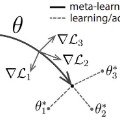Recently, model-agnostic meta-learning (MAML) has garnered tremendous attention. However, the stochastic optimization of MAML is still immature. Existing algorithms for MAML exploit the "episode" idea by sampling some tasks and some data points for each sampled task at each iteration for updating the meta-model. However, they either do not necessarily guarantee convergence with a constant mini-batch size or require processing a large number of tasks at every iteration, which is not viable for continual learning or cross-device federated learning where only a small number of tasks are available per-iteration or per-round. This paper addresses these issues by (i) proposing efficient memory-based stochastic algorithms for MAML with the vanishing convergence error, which only requires sampling a constant number of tasks and a constant number of data samples per-iteration; (ii) proposing communication-efficient distributed memory-based MAML algorithms for personalized federated learning in both the cross-device (with client sampling) and the cross-silo (without client sampling) settings. The theoretical results significantly improve the optimization theory for MAML and the empirical results also corroborate the theory.
翻译:最近,模型-不可知元学习(MAML)引起了极大的注意,然而,MAML的随机优化仍然不成熟。MAML的现有算法通过抽样抽查每个迭代中每个抽样任务的某些任务和数据点,来利用“阴极”概念来更新元模,然而,这些算法不一定保证与一个不变的微型批量尺寸趋同,或要求在每一次迭代中处理大量的任务,这对于持续学习或交叉化联合学习来说是不可行的,因为只要只有少量的一线或全线任务,MAML的现有算法就可以解决这些问题。这份文件通过(一) 提出有效的MAML基于内存的随机算法与消失的汇合错误,这只需要对固定的任务数进行抽样,并不断有一定数量的数据样品来更新元模; (二) 提出通信效率分布的基于记忆的MAML算法算法,用于在交叉迭代(客户抽样)和跨筒(不包括客户抽样)环境中进行个人化的节化学习。这个理论性结果也大大改进了MAML的模拟理论。




